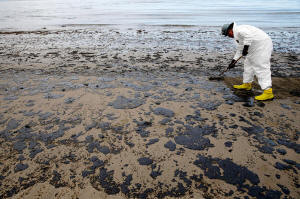Trump officials back firm in fight over California offshore oil drilling
after huge spill
[October 15, 2025] By
JULIE WATSON
When the corroded pipeline burst in 2015, inky crude spread along the
Southern California coast, becoming the state’s worst oil spill in
decades.
More than 140,000 gallons (3,300 barrels) of oil gushed out, blackening
beaches for 150 miles (240 kilometers) from Santa Barbara to Los
Angeles, polluting a biologically rich habitat for endangered whales and
sea turtles, killing scores of pelicans, seals and dolphins, and
decimating the fishing industry.
Plains All American Pipeline in 2022 agreed to a $230 million settlement
with fishers and coastal property owners without admitting liability.
Federal inspectors found that the Houston-based company failed to
quickly detect the rupture and responded too slowly. It faced an uphill
battle to build a new pipeline.
Three decades-old drilling platforms were subsequently shuttered, but
another Texas-based fossil fuel company supported by the Trump
administration purchased the operation and is intent on pumping oil
through the pipeline again.
Sable Offshore Corp., headquartered in Houston, is facing a slew of
legal challenges but is determined to restart production, even if that
means confining it to federal waters, where state regulators have
virtually no say. California controls the 3 miles (5 kilometers) nearest
to shore. The platforms are 5 to 9 miles (8 to 14 kilometers) offshore.

The Trump administration has hailed Sable’s plans as the kind of project
the president wants to increase U.S. energy production as the federal
government removes regulatory barriers. President Donald Trump has
directed Interior Secretary Doug Burgum to undo his predecessor’s ban on
future offshore oil drilling on the East and West coasts.
Environmentalist sue to stop the project
"This project risks another environmental disaster in California at a
time when demand for oil is going down and the climate crisis is
escalating," said Alex Katz, executive director of Environmental Defense
Center, the Santa Barbara group formed in response to a massive spill in
1969.
The environmental organization is among several suing Sable.
“Our concern is that there is no way to make this pipeline safe and that
this company has proven that it cannot be trusted to operate safely,
responsibly or even legally,” he said.
Actor and activist Julia Louis-Dreyfus, who lives in the area, has
implored officials to stop Sable, saying at a March protest: “I can
smell a rat. And this project is a rat.”
The California Coastal Commission fined Sable a record $18 million for
ignoring cease-and-desist orders over repair work it says was done
without permits. Sable said it has permits from the previous owner,
Exxon Mobil, and sued the commission while work continued on the
pipeline. In June, a state judge ordered it to stop while the case
proceeds through the court. The commission and Sable are due back in
court Wednesday.
“This fly-by-night oil company has repeatedly abused the public’s trust,
racking up millions of dollars in fines and causing environmental damage
along the treasured Gaviota Coast,” a state park south of Santa Barbara,
said Joshua Smith, the commission’s spokesman.

Sable keeps moving forward
So far, Sable is undeterred.
The California Attorney General’s office sued Sable this month, saying
it illegally discharged waste into waterways, and disregarded state law
requiring permits before work along the pipeline route that crosses
sensitive wildlife habitat.
“Sable placed profits over environmental protection in its rush to get
oil on the market,” the agency said in its lawsuit.
Last month, the Santa Barbara District Attorney filed felony criminal
charges against Sable, also accusing it of polluting waterways and
harming wildlife.
[to top of second column] |

A worker removes oil from the sand at Refugio State Beach, north of
Goleta, Calif., May 21, 2015. (AP Photo/Jae C. Hong, File)
 Sable said it has fully cooperated
with local and state agencies, including the California Department
of Fish and Wildlife, and called the district attorney's allegation
“inflammatory and extremely misleading.” It said a biologist and
state fire marshal officials oversaw the work, and no wildlife was
harmed.
The company is seeking $347 million for the delays, and says if the
state blocks it from restarting the onshore pipeline system, it will
use a floating facility that would keep its entire operation in
federal waters and use tankers to transport the oil to markets
outside California. In a filing with the U.S. Securities and
Exchange Commission on Thursday, the company updated its plan to
include the option.
Fulfilling the president's energy promise
The U.S. Interior Department’s Bureau of Safety and Environmental
Enforcement said in July it was working with Sable to bring a second
rig online.
“President Trump made it clear that American energy should come from
American resources,” the agency’s deputy director Kenny Stevens said
in a statement then, heralding the "comeback story for Pacific
production.”
The agency said there are an estimated 190 million barrels (6
billion gallons) of recoverable oil reserves in the area, nearly 80%
of residual Pacific reserves. It noted advancements in preventing
and preparing for oil spills and said the failed pipeline has been
rigorously tested.
“Continuous monitoring and improved technology significantly reduce
the risk of a similar incident occurring in the future,” the agency
said.
CEO says project could lower gas prices
On May 19 — the 10th anniversary of the disaster — CEO Jim Flores
announced that Sable “is proud to have safely and responsibly
achieved first production at the Santa Ynez Unit” — which includes
three rigs in federal waters, offshore and onshore pipelines, and
the Las Flores Canyon Processing Facility.

State officials countered that the company had only conducted
testing and not commercial production. Sable's stock price dropped
and some investors sued, alleging they were misled.
Sable purchased the Santa Ynez Unit from Exxon Mobil in 2024 for
nearly $650 million primarily with a loan from Exxon. Exxon sold the
shuttered operation after losing a court battle in 2023 to truck the
crude through central California while the pipeline system was
rebuilt or repaired.
Flores said well tests at the Platform Harmony rig indicate there is
much oil to be extracted and that it will relieve California's gas
prices — among the nation's highest — by stabilizing supplies.
“Sable is very concerned about the crumbling energy complex in
California," Flores said in a statement to The Associated Press.
“With the exit of two refineries last year and more shuttering soon,
California’s economy cannot survive without the strong energy
infrastructure it enjoyed for the last 150 years.”
California has been reducing the state’s production of fossil fuels
in favor of clean energy for years. The movement has been
spearheaded partly by Santa Barbara County, where elected officials
voted in May to begin taking steps to phase out onshore oil and gas
operations.
_____
Associated Press writer Matthew Brown in Billings, Montana
contributed to this report.
All contents © copyright 2025 Associated Press. All rights reserved |